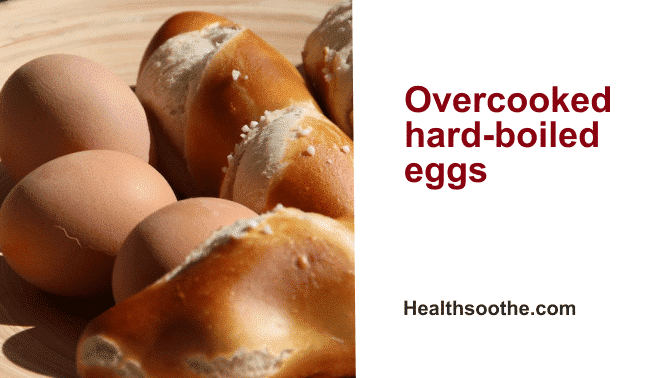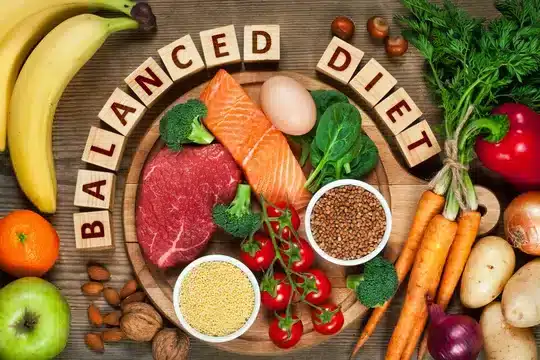Most people who have ever prepared boiled eggs have also overdone them. It’s incredibly simple to get into the “there’s no such thing as too long” mentality while [mfn]hard-boiling eggs[/mfn] since it doesn’t appear to matter.
Who matters how long you cook them for as long as you boil them long enough for the yolks to get hard?
But if you overcook your eggs, you could notice that the yolks get an odd green or grey colour.
Although the exterior may still be yellow, the inside may not, which may make you wonder whether overdone boiled eggs are safe to consume.
Can you eat boiled eggs that are overdone? Yes, even if you have significantly overdone your boiled eggs, it is safe to consume them.
If the yolk has a little green hue, it should still be safe to consume after cooking as long as the egg was fresh when it was fried. Concerning overcooking your eggs, don’t worry.
The egg whites emit a hazardous gas called hydrogen sulphide when they are boiled. Particularly when the eggs are overboiling, this occurs.
If you’ve observed, the green covering on the [mfn]yolk of overcooked eggs[/mfn] is a warning that you shouldn’t consume them.
Read Also: Poultry meat allergy in bird-egg syndrome
Are Overcooked Boiled Eggs Always Safe?
Yes, assuming that they were prepared with fresh eggs, overdone-boiled eggs should always be safe. There are no substances or reactions that might be dangerous.
Even when eggs are overdone, the quantity of sulphur present keeps people safe. You may have heard that eggs’ sulphur content makes them deadly by generating hydrogen sulphide.
Even if they do emit a little quantity of gas into the egg, it won’t harm you.
Boiling eggs are perfectly fine to consume unless you have an egg allergy. No one has ever been reported to have been sick after eating an overdone boiled egg.
What Makes the Green Layer on a Boiled Egg Yolk?
As previously noted, when you chop into a cooked egg, you could sometimes see a green coating on the outside of the yolk. This layer of green is entirely safe.
It occurs from the egg’s iron and sulphur interacting with the yolk’s surface and is completely harmless to you.
Even though the yolk of your egg is not overdone, you could sometimes see this ring around it. That often indicates that the water you used to cook the egg has a lot of iron.
Once again, you should not be concerned since it won’t do any harm to you. Simply disregard it and eat your egg as you normally would with a brilliant yellow yolk.
How Long Should You Cook an Egg to Hard Boil It?
Normally, a boiled egg has to simmer for nine minutes, but you may cook it for up to twelve if you want a truly hard middle. While cooking for longer periods of time is frequently regarded as overcooking, there are drawbacks that we’ll discuss in a moment.
While there are several ways to boil eggs, many people choose to start by submerging their eggs in cold water. After that, put it over high heat to bring it to a boil.
Then, a lot of folks switch off the heat and put a lid on the pan. At this moment, start the timer. The middle will be slightly soft but still thick after four minutes, and it will be entirely cooked after twelve minutes.
Take them out a bit earlier if you want a more runny yolk. Take into mind the egg’s size while timing as this will affect how soon it cooks to some extent. Larger eggs will take a bit longer to cook than eggs that are obviously smaller.
The eggs may be taken out when the stipulated amount of time has passed and submerged in ice water. They can’t continue to cook because of this. If you leave them out, the heat retained within the egg will keep cooking it, which might cause it to overcook.
This is considerably more likely to occur if you leave them in the hot water. To lessen the possibility of overcooking eggs and spoiling them, try to remove them from the fire as soon as possible.
The majority of techniques advise rinsing them in cold water, repeating the procedure, and cooling the eggs as quickly as you can. Although you are not required to do this, you might discover that your eggs turn out better as a result.
Are there Disadvantages to Overcooking a Boiled Egg?
Why is it important if you overcook a cooked egg if there are no health risks involved? Unfortunately, overcooking boiled eggs have a severe impact on both their flavour and texture, making for a far less satisfying dinner.
Depending on how overdone it is, a boiled egg is often rubbery. Don’t worry if you just leave it on for an additional minute or two; everything will be OK. However, if you left your eggs unattended for a few hours and then remembered about them much later, the whites may no longer be soft.
It may be uncomfortable and “bouncy” to bite into an overdone boiled egg, and you can struggle with the texture of the white. The yolk might also be damaged.
Whether or not it has a green surface, it may be quite dry and unattractive when it is overdone and has a tendency to become chalky.
An overcooked egg also has an unpleasant flavour. Many individuals discover that an overcooked egg has far more sulphur than a normal egg, which may be unpleasant. It may be necessary to somewhat mask the taste of a forgotten hard-cooked egg with sauce or spice before attempting to eat it.
An overcooked egg may also be more difficult for some individuals to digest. This could be the case because boiling changes the texture and denatures the proteins, making it more challenging for your body to break them down.
Conclusion
While overcooked eggs are not harmful to your health, they are not as tasty as eggs that have been boiled for the proper length of time.
Part individuals find them more difficult to digest, and they could lose some of their flavour and texture. Use a trustworthy timer whenever you can to prevent overcooking your eggs.




